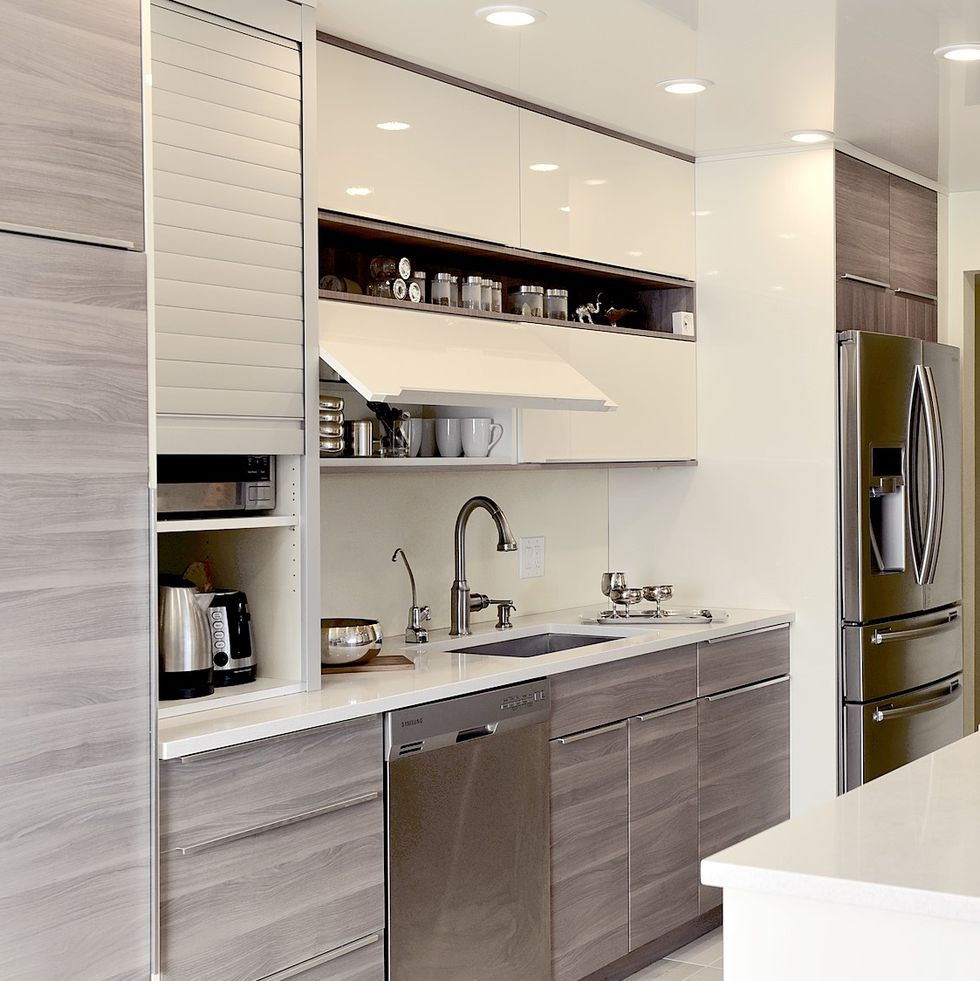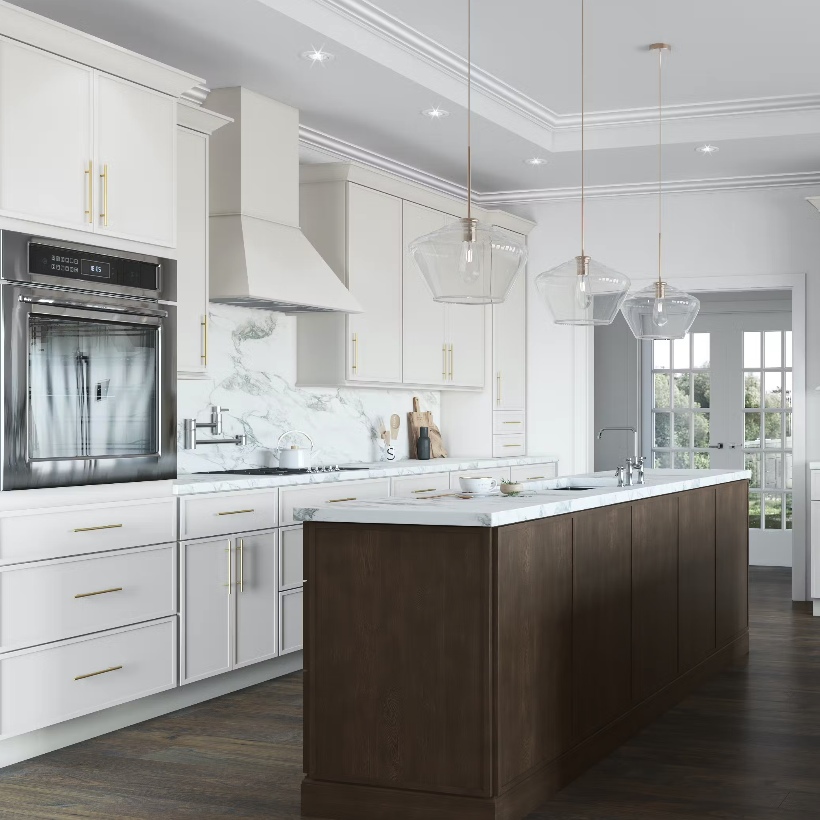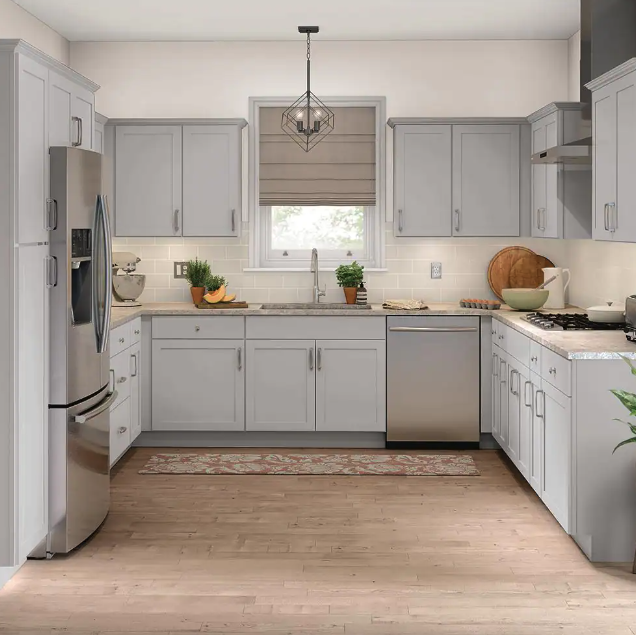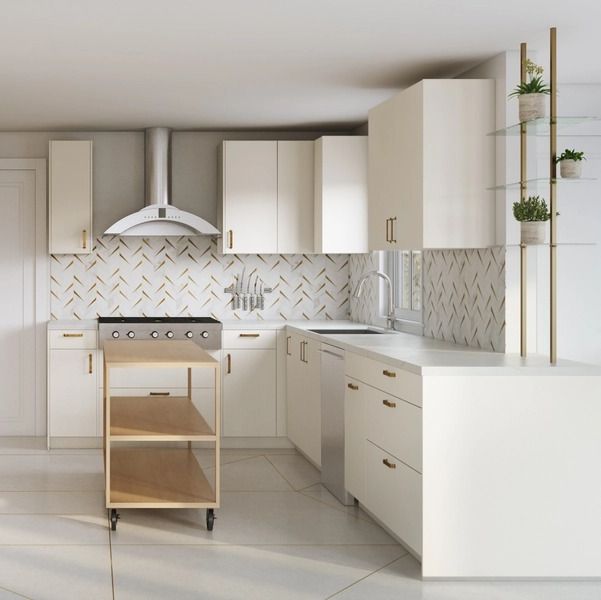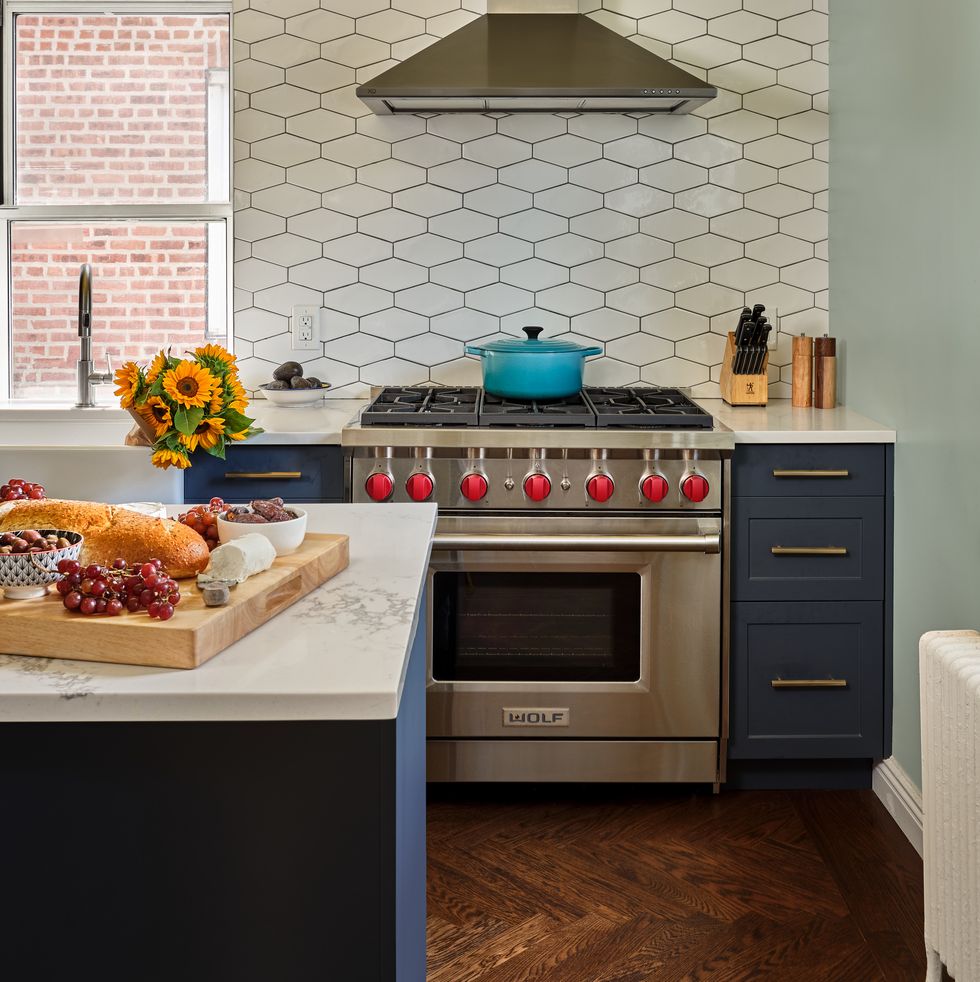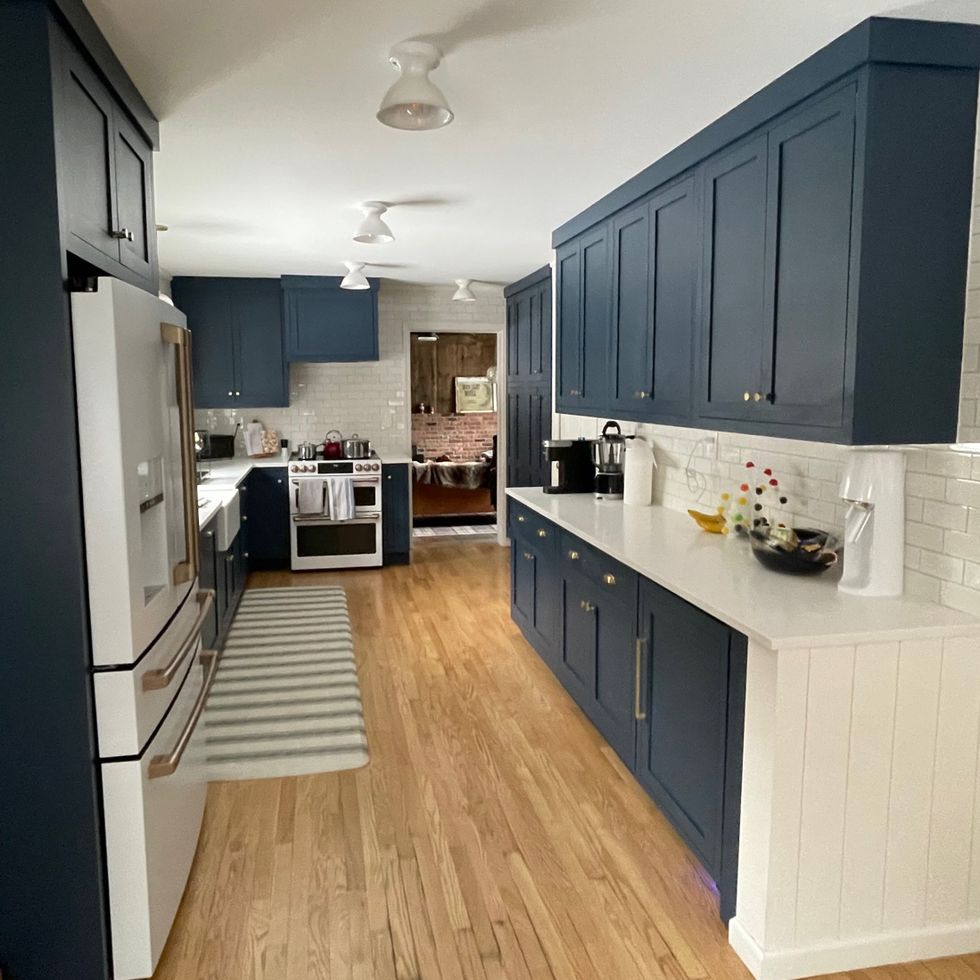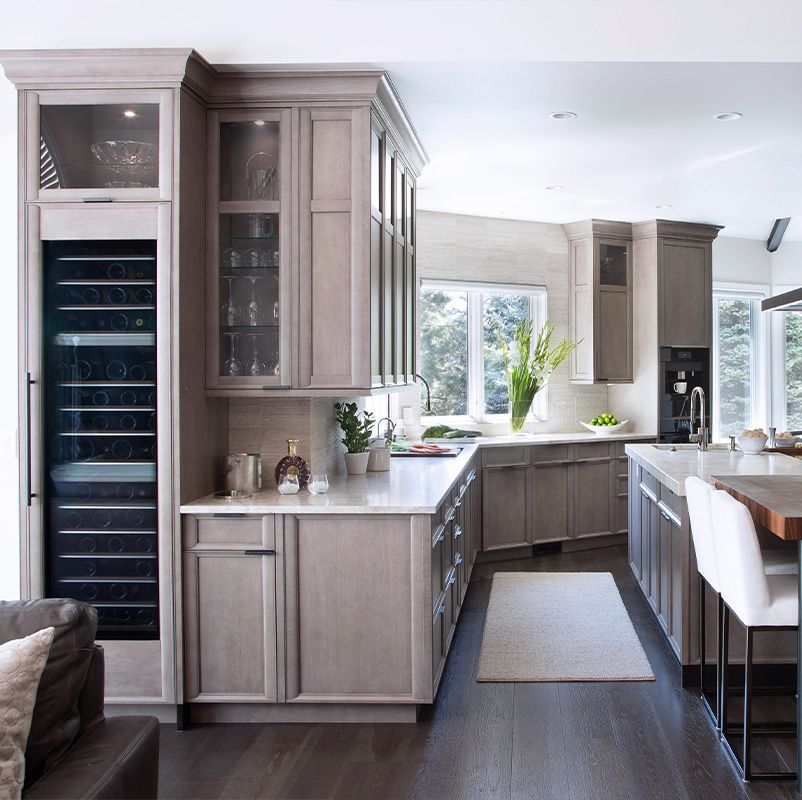
9 Best Kitchen Cabinets of 2023
Cabinets are often the biggest-ticket item in a kitchen remodel, accounting for up to 40{833736ef333566f6502cdebaaa8c1006aee7f6f644158cfddacfa746ee20c4df} of the total cost — and that makes sense, considering their impact on the look and functionality of any kitchen, not to mention the fact that they tend to hang around for decades.
“Kitchen cabinets aren’t something you replace readily, like a light fixture or coat of paint, so it pays to invest as much as your budget allows to end up with units that you love and that meet your needs,” says Rozit Arditi, owner of Arditi Design, a full-service residential interior design studio based in New York City.
The good news is that kitchen cabinet manufacturers carry a diverse array of product lines to serve a wide range of kitchen remodel budgets, from $10K or less for a cost-conscious cosmetic makeover to $100K and up for high-end gut jobs.
More From Good Housekeeping

For this review of the best kitchen cabinet brands you can buy right now, the home renovation pros in the Good Housekeeping Institute found that quality offerings can be found at every price point. While there are clearly tradeoffs that come as you move up the price ladder, in our research, we spoke to pros and homeowners alike who have been satisfied with their kitchen cabinet installations at every level.
Our top picks
After conducting extensive research of the market, here are our recommendations for the best cabinet brands, divided into three categories: stock, semi-custom and custom. At the bottom of this guide, you’ll find more information about how we selected these brands, as well as expert advice for finding the perfect kitchen cabinets for your style and budget.
Best Stock Kitchen Cabinets
IKEA
The Swedish mass-retailer of ready-to-assemble furniture is also a one-stop shop for all your kitchen remodeling needs, including surprisingly durable and design-forward cabinets. Our experts have been impressed by the quality of IKEA’s construction, which includes dovetail joinery and full-extension drawer glides. Of course, there’s no mistaking the melamine foil-fronted doors and drawers for real wood, nor are the MDF and particleboard boxes any substitute for solid wood. But if you’re able to embrace the synthetic materials and contemporary IKEA look, the brand’s cabinets can form the foundation of a stylish kitchen that should hold up for many years.
That’s what Bellevue, Washington-based interior designer Anna Popov, who typically works with custom cabinets, discovered when she designed a kitchen for a friend using IKEA cabinets. “There wasn’t a lot of room in the budget, but we were able to create a custom look with a few tricks of the trade,” she says. That included adding “flush fillers” to gaps between the cabinets and walls to make the units look built in. Popov returns to the home every year for a holiday party and can attest to how well the kitchens have held up over time. “No one believes this is an IKEA kitchen,” she says.
- Pros: Excellent value, durable construction, short lead times
- Cons: Limited design choices, foil finishes, assembly required
- Price: $ — $$
Fabuwood
While IKEA is synonymous with stock cabinets, there are many other stock options out there, including brands that deliver a more traditional aesthetic. One of our favorites is Fabuwood, a relative newcomer to the industry, founded in 2009 in New Jersey. Its 1-million-square-foot production facility in Newark, NJ ships RTA (short for “ready-to-assemble”) cabinets in a range of styles nationwide. Though technically stock cabinets, the materials and construction are what you’d typically find with semi-custom units, including solid wood door frames (around MDF panels) and durable factory finishes.
Good Housekeeping‘s deputy visual director Ulrika Thunberg, with the very discerning eye required of her job, chose Fabuwood because of the quality design it offered, which she felt was lacking in other cost-effective stock cabinets options; she opted for the Luna Dove line, with its clean lines and polished finish. Thunberg is confident in the performance of Fabuwood, too. “We stayed in a sublet that had the same cabinets installed, so we were able to test run them and were very happy with the performance,” she says.
- Pros: Competitive prices, wide range of designs for stock units
- Cons: Engineered materials, limited sizes, longer lead times
- Price: $$ – $$$
Hampton Bay
Home centers are another good source of kitchen cabinets, both pre-assembled and flat-pack. For Home Depot shoppers, Hampton Bay is the brand we recommend, based on our extensive experience testing other products from the manufacturer, from gazebos to patio heaters.
Hampton Bay products are value-driven, boasting simple designs and quality construction, and that’s exactly what you’ll find in the collection’s stock cabinets. Design choices are limited, but that’s not necessarily a bad thing, since kitchen trends these days are still geared towards clean, simple lines, whether in a classic Shaker style or contemporary slab-door cabinet.
As for the construction, “of course it’s not on the same level as what we see with custom cabinets, including more use of laminate and pocket-screw assembly instead of stronger dovetail joints,” says Rachel Rothman, executive technical director of the Good Housekeeping Institute. “Nevertheless, budget cabinets from Hampton Bay should deliver many years of service.” We also like that fact that the Home Depot provides free delivery, as well as optional installation through its network of certified installers. That means your new kitchen cabinets could be in place within a couple of weeks, compared with the many months of lead time required with semi-custom and custom units.
- Pros: Affordable prices, free delivery, short lead times
- Cons: Limited design options, engineered materials
- Cost: $$
Best Semi-Custom Kitchen Cabinets
Form Kitchens
Form Kitchens is a relatively new company that’s looking to shake up the kitchen cabinet market with its direct-to-consumer model, similar to what Casper did with mattresses or Warby Parker with eyeglasses. The brand is the brainchild of Danny Soos, a London software engineer who, during his own remodeling experience, was frustrated that all the best-in-class, contemporary cabinets he saw in showrooms were way beyond his budget. By eliminating the middle dealer and working directly with a German manufacturer, Form promises sleek, modern, European-style kitchens for a fraction of the cost of custom units.
Laurie Jennings, general manager of the Good Housekeeping Institute, went with Form on her recent kitchen renovation, and was largely impressed by the experience and end results. “It’s a platform-based experience, so all communication happens through the app or online,” she says. “One standout was the ultra-talented designer, Bianca, that we got to work with. I also loved the exceptionally accurate 3D renderings they made of our space, which helped us choose lighting, countertops, hardware and more — even if we then had to order them all separately.”
While Form has limited showrooms in some major cities (Jennings visited the one in New York), you can order samples of its cabinets before finalizing your project, so you can see what the final finish and color will be. Form says it can deliver within 18 weeks of a project’s start date. It was closer to a year for Jennings, though she admits part of the delay was likely caused by her own difficulty in making some decisions and the fact that pandemic timing impacted her appliance choice. But once the order was placed, she liked how easy it was to track its status through the app, right up to the day of delivery.
Form doesn’t handle installation, one sticking point in an otherwise seamless process. Jennings used her own contractor for the install. “Everything fits perfectly,” she says. “The cabinets weren’t particularly cheap, but they’re stunning, well-built and definitely saved me over the cost of custom units.”
Explore Form Kitchens Cabinets
- Pros: Streamlined design process, intuitive app-based platform
- Cons: Longer lead times, installation not included
- Price: $$ — $$
Semihandmade
When Semihandmade launched in 2011, it was a big disruptor to the cabinet industry. Its then-novel approach of “hacking” IKEA cabinets enabled customers to buy just the cabinet boxes from the retailer before adding semi-custom doors, drawers, trim and hardware. As we noted earlier, our experts have been impressed by the overall construction quality of IKEA cabinetry, and while upgrading to Semihandmade facades adds another $2,500 to $4,500 to the cost of the standard IKEA boxes, it’s a worthwhile option for homeowners who want a more personalized look for their kitchens.
Ten years after the launch of Semihandmade, the company started a sister brand called Boxi with a similar direct-to-consumer model as Form, though for the time being it’s only available in the western U.S. Boxi customers choose from eight curated cabinet styles, including Shaker and slab, and provide basic dimensions of their space. Within four to 12 weeks, the assembled units are delivered. Boxi is aimed at DIY consumers who are up to for challenge of hanging their own cabinets, though it also has a network of installers you can hire.
- Pros: Personalized look at affordable prices
- Cons: Direct-to-consumer option limited to western U.S. states
- Price: $$ — $$$
Wellborn Cabinet
Located in Ashland, Alabama, Wellborn is another major cabinet manufacturer that has built a reputation for quality and reliability over more than six decades. We know the brand well from attending trade shows like the Kitchen & Bath Industry Show (KBIS), where we’ve been able to get hands-on with the brand’s latest design offerings. “Wellborn has one of the more extensive semi-custom cabinet lines covering both frameless and framed units,” says Rothman.
Wellborn’s Estate line, for example, is available in both custom and semi-custom units, and comes in over 30,000 door styles, door materials and finish combinations. Through Wellborn’s partnership with Sherwin-Williams, Benjamin Moore and Valspar paint companies, the color options are virtually limitless, too. And because Wellborn is so established, it has a massive network of dealers and contractors to assist you through every phase of the project, from design to installation.
- Pros: Established brand, nationwide distribution, offers design and installation
- Cons: Size limitations prevent fully built-in look
- Price: $$$
Best Custom Cabinets
Omega Cabinetry
Omega is the custom line of MasterBrand, one of the most established cabinet manufacturers in the U.S. So, while it delivers a truly custom product, with hand-crafted construction and top-quality materials and finishes, it also has the customer service infrastructure of a major corporation, including an extensive dealer network and stable supply chain. Our experts like Omega’s wide range of cabinet styles, in both framed and frameless construction, making the brand a suitable option for just about any kind of home.
That array of benefits drew Lauren Matthews, Good Housekeeping’s digital content director, to Omega’s cabinets for her recent kitchen remodel. A local showroom guided her through the design and ordering process. “It was an easy and simple process that a rep from their team walked us through,” says Matthews. With the help of Portland, Oregon-based interior designer Max Humphrey, she opted for Omega’s Plainfield Shaker cabinets, an enduring style defined by clean, simple lines. It was eight weeks between order and delivery, a swift timeline for custom units. “The cabinets so far have been durable and look great,” Matthews reports. “We have dark blue cabinets, which means that they can get a little scuffed sometimes, but we have a little blue touch-up pen that Omega gave us to make any marks go away fast.”
- Pros: Wide range of styles, relatively quick lead times
- Cons: Higher price point
- Price: $$$ — $$$$
Rutt Cabinetry
If there’s a capital of cabinet making in the U.S., it’s Lancaster County, Pennsylvania, with its centuries-old tradition of hand-crafted millwork carried out by the region’s Amish and Mennonite communities. Rutt Cabinetry was born out of this heritage back in 1951 and it still operates that way today out of its production center in New Holland, PA. Though Rutt’s manufacturing process has taken on new technologies, its cabinets are characterized by timeless craftmanship, including the use of hand-selected lumbers and oven-cured finishes with a clear conversion varnish to protect against stains and scratches. Bottom line: Rutt cabinets are beautifully built to last.
Just ask Carolyn Forté, executive director of the Home Care & Cleaning Lab at the Good Housekeeping Institute. When she redid her kitchen 30 years ago, Rutt was the only cabinet brand she considered, after she was lucky enough to visit the Pennsylvania factory and see the craftsmanship first-hand. “My kitchen is still as beautiful and functional as ever, even three decades later,” she says. “The cabinets don’t need to be replaced, but if I ever do another kitchen, I will definitely go with Rutt again.”
Local Millwork Shops
Local millwork shops in your area are also another excellent source of custom cabinets. These are typically privately owned businesses that specialize in the design and fabrication of cabinetry and other furniture. Each shop is unique, which is part of the appeal, but it also means you might need to do more legwork to find the right match. A smart strategy is to work with a kitchen designer who will have their own Rolodex of vendors.
“I have a background in millwork and furniture design, so there are several shops that I’ve worked with for many years,” says Arditi. One of her go-tos is Edgewood Made, a Philadelphia-based custom millwork shop specializing in contemporary cabinets made from locally sourced domestic hardwood, including maple, cherry, ash, white oak and walnut.
To find a designer who can then connect you with their recommended local millwork shops, try the National Kitchen & Bath Association (NKBA) or the American Society of Interior Designers (ASID), both of which have member directories on their websites. If you’re working with an architect on your kitchen renovation, they can also be a good source of local millworkers.
- Pros: Highly personalized service, locally sourced materials
- Cons: Referrals are mostly word-of-mouth, making shops harder to find
- Price: $$$$
How we chose
To pull together this list of top cabinet brands, we focused on manufacturers and millworkers with strong reputations for quality and reliability, based on our Good Housekeeping Institute experts’ many decades of home renovation product testing and reviews. (Fun fact: Way back in 1908, the GH Experiment Station, which evolved into today’s GH Institute, led the charge to set a comfortable 36-inch base cabinet-plus-countertop height, which is still the industry standard today).
For this review, we assessed materials, methods of construction and available features, like internal organizers and integrated lighting. We also looked at customer service offerings, including number of showrooms and support services around design and installation. Finally, we considered warranties, since the extent to which a brand stands behind its product is always a good indication of its ability to hold up over the long haul.
What to look for
Since the selection of kitchen cabinets is heavily price-driven, figuring out which category your budget falls in is the important first step. Then there are a couple other factors to consider. Here’s what you need to know.
Pick the category
There are three main ones to choose from:
✔️ Stock Cabinets: These budget cabinets are the way to go if you don’t mind limited style and size options. They either come fully assembled or in flat-pack versions (also known as RTA, or ready-to-assemble) that will need to be put together onsite. The material is often veneered particleboard or a foil-covered medium-density fiberboard (MDF) panel. Though mass-produced, some stock cabinets are fairly durable, with dovetail joinery and full-extension drawer glides.
Cost: $100 to $300 per linear foot, installed, or $2,500 to $7,500 for an average kitchen
✔️ Semi-Custom Cabinets: These units come in more styles and configurations, so they’ll fit your kitchen more precisely, if not perfectly. Widths are usually in 1/4-inch increments, rather than the typical 3 inches you see with stock units. We think semi-custom is the best value option, hitting the sweet spot between price and performance. However, features and quality can vary considerably in this category, so be sure to go with a reputable brand, like those featured in this report.
Cost: $150 to $650 per linear foot, installed, or $4,000 to $16,000 for an average kitchen
✔️ Custom Cabinets: These top-of-the line cabinets are hand-crafted to the exact dimensions of your kitchen, for a totally built-in look. You will be able to choose from any style, plus all the bells and whistles when it comes to features. The units are made from premium materials, include top-grade lumber, paints and stains.
Cost: $500 to 1,200-plus per linear foot, installed, or $15,000 to $30,000+ for an average kitchen
Select the style
There are two choices, framed and frameless:
✔️ Framed Cabinets: These cabinets consist of a box and face frame which the doors and drawers attach to. Their look tends to be more traditional. The best face frame cabinets use a 3/4-inch solid wood face frame, making for an extremely stable and durable cabinet.
✔️ Frameless Cabinets: Also known as European-style, these cabinets eliminate the face frame and instead have doors and drawers that attach directly to the cabinet box. The result is a more contemporary look with easier access to the interiors. But frameless cabinets are not to as rigid as framed units.
Choose the features
You will have the most options to choose from with custom units, but even budget cabinets today come with features that increase utility without a huge investment. Here are the ones our experts say add the most value:
✔️ Storage Accessories: Think about you use your kitchen and which cabinet features will provide the most functionality. Retractable trash and recycling bins are storage options that most consumers appreciate. If you cook a lot, a tiered cutlery drawer or pull-out spice rack might make the most sense. If you’re short on pantry space, adding a Lazy Susan to a base corner cabinet might be worthwhile. “We did a tip-out tray in front of the kitchen sink and it’s where we hide our kitchen sponges,” says Good Housekeeping’s cleaning and organization pro Carolyn Forté.
✔️ Integrated Electronics: Built-in lighting has become very popular in recent years, including fixtures that turn on when a door or drawer is opened in a pantry or dark corner cabinet. Integrated under-cabinet lighting is great for adding essential task light to countertop work areas. Consider adding a USB port to a drawer or cabinet to charge your smartphone and other electronics.
✔️ Hardware Upgrades: Full-extension drawer guides function better than integrated side rails. Soft-close stops that prevent doors and drawers from slamming shut are another worthwhile upgrade, our experts say. As for handles and pulls, the choice of finish is an opportunity to tie the kitchen together by mixing and matching with the other finishes in the space, including those on faucets and light fixtures.
Why trust Good Housekeeping?
Dan DiClerico has covered the home improvement market for nearly 25 years. In that time, he has written dozens of articles about kitchen cabinets for a variety of outlets, including This Old House, Martha Stewart Living and Consumer Reports. In 2022, he joined the Good Housekeeping Institute as the director of the Home Improvement & Outdoor Lab. In his role, he oversees testing of kitchen cabinets, along with other remodeling products, like countertops, flooring and windows. Dan is also a serial remodeler, and most recently completed the gut renovation of the 19th-century brownstone where he lives with his wife and kids. Dan is also a regular at housing trade shows, where he keeps up with the latest cabinet designs and innovations.
Home Improvement & Outdoor Director
Having written thousands of product reviews and how-to articles on all aspects of home ownership, from routine maintenance to major renovations, Dan (he/him) brings more than 20 years of industry experience to his role as the director of the Home Improvement & Outdoor Lab at the Good Housekeeping Institute. A one-time roofer and a serial remodeler, Dan can often be found keeping house at his restored Brooklyn brownstone, where he lives with his wife and kids.
